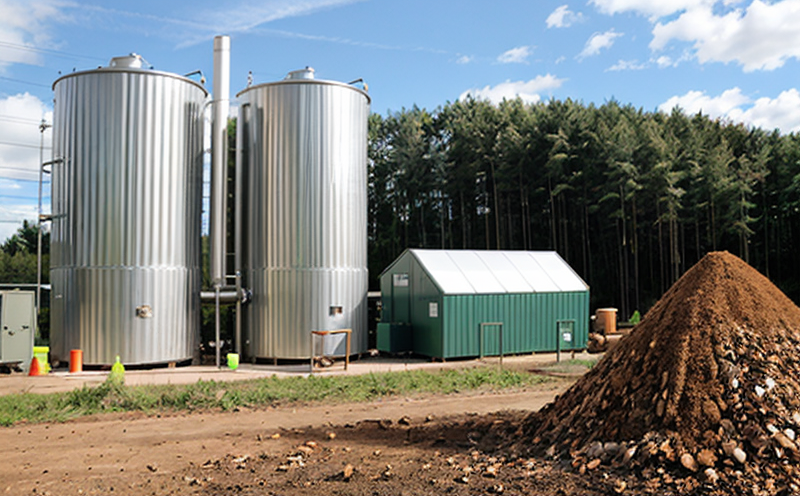Waste-to-Energy Conversion & Biomass Testing
The conversion of waste to energy and biomass testing is a critical sector in modern environmental management. This service focuses on optimizing waste resources, reducing landfill use, and promoting sustainable practices that benefit both the environment and society.
Waste-to-energy (WtE) processes involve the generation of heat, electricity, or fuel from organic materials such as wood, paper, or food scraps. Biomass testing is another component of this service, which evaluates plant-based materials to determine their suitability for energy production.
Our laboratory provides a comprehensive suite of tests that ensure compliance with international standards and support the development of innovative solutions in waste management and recycling. These services are particularly valuable for quality managers, compliance officers, R&D engineers, and procurement professionals who need accurate data on the conversion efficiency and environmental impact of various materials.
Our testing methods follow strict protocols that include sample preparation, chemical analysis, calorimetric measurements, and thermal analysis to determine the energy content and other relevant properties of waste and biomass. This ensures that our clients receive reliable results that can be used for decision-making purposes or regulatory compliance.
The primary aim is to ensure that all tests conducted meet international standards such as ISO 15216-3, EN 12978, ASTM D5465, and others. These standards provide a benchmark for the accuracy and reliability of our testing methods. Compliance with these standards ensures that our clients can trust the results they receive.
Our laboratory uses advanced analytical equipment like proximate analysis instruments, calorimeters, and thermogravimetric analyzers to perform these tests accurately. The data generated from these analyses is crucial for optimizing waste-to-energy processes and ensuring the quality of biomass materials.
The process begins with sample collection, which involves selecting a representative sample size that reflects the characteristics of the entire batch or stream being tested. Sample preparation then follows strict protocols to ensure consistency across samples. This includes drying, grinding, and homogenizing the material before analysis.
Calorimetric measurements are used to determine the calorific value of biomass materials, which is a key parameter for assessing their energy content. Thermogravimetric analysis (TGA) provides information on the thermal stability and composition changes during heating, while proximate analysis helps identify the moisture, volatile matter, ash, and fixed carbon content.
These tests are essential for understanding the energy potential of waste materials and optimizing processes for maximum efficiency. By providing accurate data, our laboratory supports clients in making informed decisions about waste management strategies and biomass utilization.
We also offer assistance with regulatory compliance by ensuring that all test results align with relevant environmental regulations. This helps ensure that our clients can meet their sustainability goals while adhering to legal requirements.
Our team of experts is dedicated to providing high-quality, accurate testing services tailored to the unique needs of each client. Whether you are developing new waste-to-energy processes or seeking to improve existing ones, we have the expertise and resources to support your efforts.
Applied Standards
The tests conducted in our laboratory adhere strictly to international standards that ensure accuracy and consistency. These include:
- ISO 15216-3: This standard provides specifications for the determination of calorific value by bomb calorimeter.
- EN 12978: This European standard outlines methods for determining the proximate analysis and ultimate analysis of biomass fuels.
- ASTM D5465: Developed by ASTM International, this method covers the determination of heating value of solid fuel by oxygen bomb calorimeter.
- EN 13987: This European standard specifies methods for determining the ultimate analysis and proximate analysis of biomass fuels using different techniques.
These standards provide a consistent framework that ensures our tests are reliable and repeatable, which is essential for both research and commercial applications. By adhering to these standards, we can ensure that all clients receive accurate and comparable results.
Benefits
- Sustainable Resource Utilization: By converting waste into energy, we reduce the need for landfilling and promote sustainable resource management.
- Economic Benefits: Waste-to-energy conversion can generate revenue through the sale of electricity or heat, contributing to economic growth.
- Environmental Protection: Reducing waste sent to landfills helps protect natural ecosystems from pollution and degradation.
- Innovation Support: Our testing services provide valuable data that can be used to develop new technologies and processes for waste management and energy production.
The benefits of our waste-to-energy conversion and biomass testing extend beyond just the laboratory. They contribute significantly to global efforts towards sustainability, economic development, and environmental protection.
International Acceptance and Recognition
The tests performed in our laboratory are internationally recognized and accepted by regulatory bodies worldwide. Compliance with international standards ensures that our clients can trust the results they receive and use them confidently for various purposes.
We work closely with industry leaders to ensure that our testing methods align with global best practices. This collaboration helps us stay at the forefront of technological advancements in waste-to-energy conversion and biomass testing.





